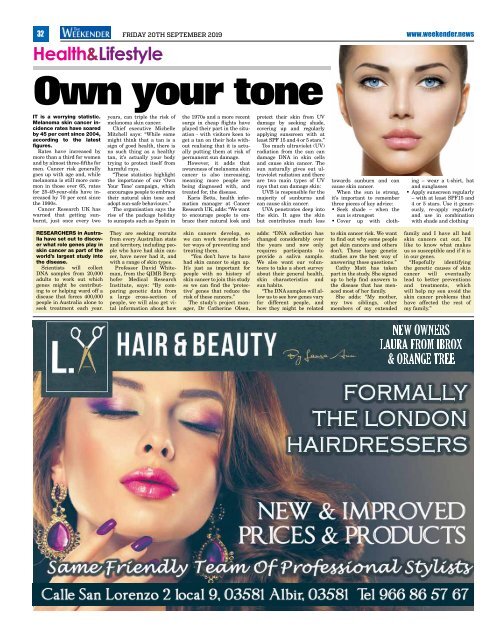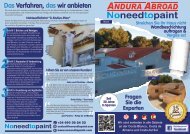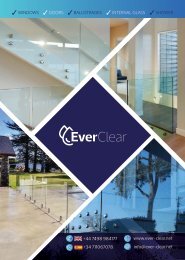You also want an ePaper? Increase the reach of your titles
YUMPU automatically turns print PDFs into web optimized ePapers that Google loves.
32 FRIDAY 20TH SEPTEMBER 2019<br />
www.weekender.news<br />
Health&Lifestyle<br />
Own your tone<br />
IT is a worrying statistic.<br />
Melanoma skin cancer incidence<br />
rates have soared<br />
by 45 per cent since 2004,<br />
according to the latest<br />
figures.<br />
Rates have increased by<br />
more than a third for women<br />
and by almost three-fifths for<br />
men. Cancer risk generally<br />
goes up with age and, while<br />
melanoma is still more common<br />
in those over 65, rates<br />
for 25-49-year-olds have increased<br />
by 70 per cent since<br />
the 1990s.<br />
Cancer Research UK has<br />
warned that getting sunburnt,<br />
just once every two<br />
years, can triple the risk of<br />
melanoma skin cancer.<br />
Chief executive Michelle<br />
Mitchell says: “While some<br />
might think that a tan is a<br />
sign of good health, there is<br />
no such thing as a healthy<br />
tan, it’s actually your body<br />
trying to protect itself from<br />
harmful rays.<br />
“These statistics highlight<br />
the importance of our ‘Own<br />
Your Tone’ campaign, which<br />
encourages people to embrace<br />
their natural skin tone and<br />
adopt sun-safe behaviours.”<br />
The organisation says the<br />
rise of the package holiday<br />
to sunspots such as Spain in<br />
the 1970s and a more recent<br />
surge in cheap flights have<br />
played their part in the situation<br />
- with visitors keen to<br />
get a tan on their hols without<br />
realising that it is actually<br />
putting them at risk of<br />
permanent sun damage.<br />
However, it adds that<br />
awareness of melanoma skin<br />
cancer is also increasing,<br />
meaning more people are<br />
being diagnosed with, and<br />
treated for, the disease.<br />
Karis Betts, health information<br />
manager at Cancer<br />
Research UK, adds: “We want<br />
to encourage people to embrace<br />
their natural look and<br />
protect their skin from UV<br />
damage by seeking shade,<br />
covering up and regularly<br />
applying sunscreen with at<br />
least SPF 15 and 4 or 5 stars.”<br />
Too much ultraviolet (UV)<br />
radiation from the sun can<br />
damage DNA in skin cells<br />
and cause skin cancer. The<br />
sun naturally gives out ultraviolet<br />
radiation and there<br />
are two main types of UV<br />
rays that can damage skin:<br />
UVB is responsible for the<br />
majority of sunburns and<br />
can cause skin cancer.<br />
UVA penetrates deep into<br />
the skin. It ages the skin<br />
but contributes much less<br />
towards sunburn and can<br />
cause skin cancer.<br />
When the sun is strong,<br />
it’s important to remember<br />
three pieces of key advice:<br />
• Seek shade – when the<br />
sun is strongest<br />
• Cover up with clothing<br />
– wear a t-shirt, hat<br />
and sunglasses<br />
• Apply sunscreen regularly<br />
– with at least SPF15 and<br />
4 or 5 stars. Use it generously,<br />
re-apply regularly<br />
and use in combination<br />
with shade and clothing<br />
RESEARCHERS in Australia<br />
have set out to discover<br />
what role genes play in<br />
skin cancer as part of the<br />
world’s largest study into<br />
the disease.<br />
Scientists will collect<br />
DNA samples from 20,000<br />
adults to work out which<br />
genes might be contributing<br />
to or helping ward off a<br />
disease that forces 400,000<br />
people in Australia alone to<br />
seek treatment each year.<br />
They are seeking recruits<br />
from every Australian state<br />
and territory, including people<br />
who have had skin cancer,<br />
have never had it, and<br />
with a range of skin types.<br />
Professor David Whiteman,<br />
from the QIMR Berghofer<br />
Medical Research<br />
Institute, says: “By comparing<br />
genetic data from<br />
a large cross-section of<br />
people, we will also get vital<br />
information about how<br />
skin cancers develop, so<br />
we can work towards better<br />
ways of preventing and<br />
treating them.<br />
“You don’t have to have<br />
had skin cancer to sign up.<br />
It’s just as important for<br />
people with no history of<br />
skin cancer to join this study<br />
so we can find the ‘protective’<br />
genes that reduce the<br />
risk of these cancers.”<br />
The study’s project manager,<br />
Dr Catherine Olsen,<br />
adds: “DNA collection has<br />
changed considerably over<br />
the years and now only<br />
requires participants to<br />
provide a saliva sample.<br />
We also want our volunteers<br />
to take a short survey<br />
about their general health,<br />
skin characteristics and<br />
sun habits.<br />
“The DNA samples will allow<br />
us to see how genes vary<br />
for different people, and<br />
how they might be related<br />
to skin cancer risk. We want<br />
to find out why some people<br />
get skin cancers and others<br />
don’t. These large genetic<br />
studies are the best way of<br />
answering those questions.”<br />
Cathy Matt has taken<br />
part in the study. She signed<br />
up to help find answers to<br />
the disease that has menaced<br />
most of her family.<br />
She adds: “My mother,<br />
my two siblings, other<br />
members of my extended<br />
family and I have all had<br />
skin cancers cut out. I’d<br />
like to know what makes<br />
us so susceptible and if it is<br />
in our genes.<br />
“Hopefully identifying<br />
the genetic causes of skin<br />
cancer will eventually<br />
lead to better preventions<br />
and treatments, which<br />
will help my son avoid the<br />
skin cancer problems that<br />
have affected the rest of<br />
my family.”<br />
NEW OWNERS<br />
LAURA FROM IBROX<br />
& ORANGE TREE<br />
Choose Sirloin or Rump 8oz Steaks<br />
Cooked To Your Liking! Served with chips salad or peas

















